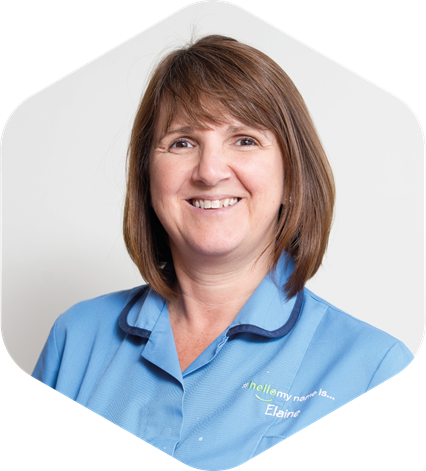This is the day in the life of Elaine Longley, Motor Neurones Disease Community Support Nurse here at Dove House Hospice!
I started working at Dove House in September 1991, first as a staff nurse on our inpatient unit then became a Junior Sister.
In 2013 an opportunity came up to be seconded for a short period of time to work exclusively with people diagnosed with MND.
I was very fortunate that after the secondment the hospice decided to continue my role as the MND support nurse, and here I am eight years later still loving my job!
What attracted you to you join the Dove House team?
My journey to where I am now started at Princess Royal Hospital working on the Urology ward, it was a busy surgical ward and at that time we admitted our patients back for end of life care. For me this was a very difficult challenge, getting patients ready for theatre was time critical unfortunately meaning those patients needing end of life care did not get the full attention I felt they required.
I felt drawn to palliative care so when a job came up at the hospice I applied and the rest we shall say is history! Starting a new team in a new environment all those years ago was exciting but very daunting. The newly established hospice brought together staff from all areas, some with experience, some with a passion for palliative care - we grew and developed as a team over the coming months.
The hospice has grown massively in the years I have worked here, the building has changed beyond recognition but at the heart of that is the support and care we provide not only for our patients and their relatives but for each other. I am incredibly proud of what the hospice continues to provide patients and families in our community.
What do you feel makes Dove House special?
The care they give to their patients, their families and everyone that works at the hospice. The care we give is person centred from end of life care, symptom management and respite care which is just a couple of the things that make the hospice special.
Working with patients with MND from diagnosis to death is a very privileged role, I get to know them and their family members and can guide them on the journey that is MND.
My role is emotional at times but I laugh with patients and cry with them. I have good support from my colleagues within the hospice team and this gets me through the tough stuff.
Tell us about your role and what do you look forward to each day?
I love how varied my days can be. From support calls, checking in on how someone is doing to assessing changes in a person’s condition and if necessary referring to a different discipline to get the appropriate help. I liaise very closely with all members of the multidisciplinary team and we hold a monthly multidisciplinary team meeting to discuss patients, their needs and how best the hospice can support them. I also attend a weekly clinic at Hull Royal infirmary where myself and the Motor Neurone specialist nurse review patients along with the consultant carrying out assessments to monitory their condition. We are also with the patients when they are given the unfortunate diagnosis of MND. Meeting patients at diagnosis is helpful as they now know our face and when we arrange to follow up with them at home shortly after they feel more comfortable talking to us.
I have been very luck in my role as it has allowed me to grow and develop. I love my job and all that comes with it, myself and the hospital specialist nurse work well together and this ensures that the hospice is introduced to this cohort of patients at diagnosis.
My role as an MND nurse brought different challenges, I was comfortable with talking about end of life issues with both patients and relatives and have a good knowledge of symptom control but working within the community was a whole new challenge for me. I was used to being part of a big team being able to look to my colleagues for advice and support in the moment. I soon settled into visiting patients in their homes and grew to love and enjoy the interaction with patients and the wider community teams, building up good working relationships with them all.